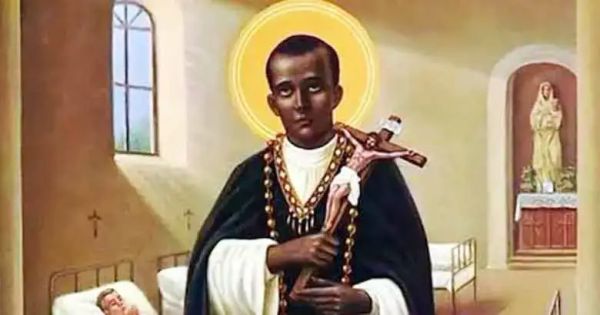Martín de Porres Velázquez OP was a Peruvian lay brother of the Dominican Order. He is the patron saint of mixed-race people, barbers, innkeepers, public health workers, and all those seeking racial harmony, and animals.
He was noted for his work on behalf of the poor, establishing an orphanage and a children's hospital. He maintained an austere lifestyle, which included fasting and abstaining from meat. Among the many miracles attributed to him were those of levitation, bilocation, miraculous knowledge, instantaneous cures, and an ability to communicate with animals.
Martin's Long Road To The Dominican Order
Under Peruvian law, descendants of Africans and Native Americans were barred from becoming full members of religious orders. The only route open to Martin was to ask the Dominicans of Holy Rosary Priory in Lima to accept him as a "donado", a volunteer who performed menial tasks in the monastery in return for the privilege of wearing the habit and living with the religious community. At the age of 15 he asked for admission to the Dominican Convent of the Rosary in Lima and was received first as a servant boy, and as his duties grew he was promoted to almoner.
Martin continued to practice his old trades of barbering and healing and was said to have performed many miraculous cures. He also took on kitchen work, laundry, and cleaning. After eight years at Holy Rosary, the prior Juan de Lorenzana decided to turn a blind eye to the law and permit Martin to take his vows as a member of the Third Order of Saint Dominic. Holy Rosary was home to 300 men, not all of whom accepted the decision of De Lorenzana: one of the novices called Martin a "mulatto dog", while one of the priests mocked him for being illegitimate and descended from slaves.
When Martin was 24, he was allowed to profess religious vows as a Dominican lay brother in 1603. He is said to have several times refused this elevation in status, which may have come about due to his father's intervention, and he never became a priest. It is said that when his convent was in debt, he implored them: "I am only a poor mulatto, sell me." Martin was deeply attached to the Blessed Sacrament, and he was praying in front of it one night when the step of the altar he was kneeling on caught fire. Throughout all the confusion and chaos that followed, he remained where he was, unaware of what was happening around him.
When Martin was 34, after he had been given the religious habit of a lay brother, he was assigned to the infirmary, where he was placed in charge and would remain in service until his death at the age of 59. He was known for his care of the sick. His superiors saw in him the virtues necessary to exercise unfailing patience in this difficult role. It was not long before miracles were attributed to him. Martin also cared for the sick outside his convent, often bringing them healing with only a simple glass of water. He ministered without distinction to Spanish nobles and to slaves recently brought from Africa. One day an aged beggar, covered with ulcers and almost naked, stretched out his hand, and Martin took him to his own bed. When one of his brethren reproved him, Martin replied: "Compassion, my dear Brother, is preferable to cleanliness."
Death & Miracles
Martin was a friend of both Saint Juan Macías, a fellow Dominican lay brother, and Saint Rose of Lima, another lay Dominican. By his death on 3 November 1639, he had won the affection and respect of many of his fellow Dominicans as well as a host of people outside the priory. Word of his miracles had made him known as a saint throughout the region. As his body was displayed to allow the people of the city to pay their respects, each person snipped a tiny piece of his habit to keep as a relic. It is said that three habits were taken from the body. His body was then interred in the grounds of the monastery.
After De Porres died, the miracles and graces received when he was invoked multiplied in such profusion that his body was exhumed after 25 years and his body was supposedly found intact, and exuded a fine fragrance. Letters to Rome pleaded for his beatification; the decree affirming the heroism of his virtues was issued in 1763 by Pope Clement XIII.
I am still searching the collection for the relic that matches the document from 1962 shown below with many Ancient Saints*

Credits:
Discriptions of saints lives and biographies have been excerpted, summarized, or compiled from
Franciscan Media,
CatholicSaints.Info,
Catholic Online, and
Wikipedia.
